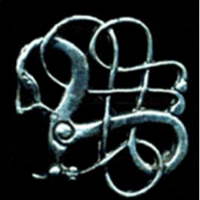The Story of NABO
The North Atlantic Biocultural Organization (NABO) was formally founded in 1992 (after a key meeting in 1988 hosted by the Peary-MacMillan Arctic Museum at Bowdoin College in Maine) in an effort to improve communication and collaboration among the growing number of scholars interested in the North Atlantic region who shared common interests but lacked a common forum for regular meetings and exchange of ideas.
Initially focused upon the archaeology and paleoecology of Viking Age colonization from Scandinavia and Britain and Ireland, the NABO cooperative has progressively expanded in temporal and geographic extent (ranging from Prehistory through the Early Modern period and with participating projects spread from Labrador to Finnmark).
NABO is strongly interdisciplinary as well as international and has aided scholars from a broad range of disciplines to set up wide ranging collaborative investigations of the interactions of humans, landscape, seascape, and climate change in the region.
NABO Project Locations

NABO participants have been recognized for contribution of a long term perspective to contemporary problems of global change, and the cooperative has been notably successful in attracting substantial funding to the region from sources on both sides of the Atlantic.
A wide range of funders have enabled this international, multidisciplinary research to be undertaken and include the National Science Foundation (US), National Geographic Society (US), PSC-CUNY (US), NERC and Leverhulme Trust (UK), RANNÍS (Iceland), Commission for Scientific Research in Greenland (Denmark and Greenland), The Carlsberg Foundation (Denmark).
NABO actively participates in the Integrated History and Future of People on Earth (IHOPE) initiative connecting to Future Earth, contributes to the Oceans Past Initiative and collaborates in the expanding UNESCO BRIDGES initiative aimed at better connecting environmental humanities, history, social science, and local and traditional knowledge to global change science and policy.
Regular NABO meetings and workshops since 1992 have stimulated international connections and provided venues for cross-fertilization across the whole North Atlantic basin, with our latest being held in Reykjavík in September 2022.
NABO Conference Videos
Since 1996, NABO has run international field schools in Iceland ranging from one focussed around Mývatn (1997-2004), to Vatnsfjörður in the Westfjords (2005-2013) and at Gufuskálar (2016-2018) on the Snæfellsness peninsula.
Other NABO field schools include the ongoing excavations at Knowe of Swandro on Rousay, Orkney (since 2010) and the Arctic Vikings Field School, Igaliku in South Greenland where the excavations are centred on the manor farm of Garðar.
NABO works to aid northern logistics, reduce costs, and pool funding for common projects. NABO has sponsored joint purchases of vehicles and other expensive field gear and has provided radiocarbon dates and specialist assistance for multiple field projects. Working groups have produced common data management systems such as NABONE, and created the NABO Project Management System, collaborated to produce the dataARC system and is further striving to make data accessible, searchable and interactive. Field staff exchange programs have provided opportunities for spreading best practice and improving the comparability of field and laboratory work across the region.
NABO works with local institutions and communities to improve outreach and education at all levels. Monographs, edited conference volumes, special issues of journals, and many individual articles in peer reviewed journals have all resulted from NABO collaborative efforts over the past years.
NABO successes have been the direct product of the hard work and exceptionally strong personal commitment of its members for three decades, and it is gratifying to see equal enthusiasm and still greater energy exhibited by the many younger scholars now involved in North Atlantic collaborative research.
Browse the NABO website
Links
- Peary-MacMillan Arctic Museum
- National Science Foundation (US)
- Integrated History and Future of People on Earth (IHOPE)
- Oceans Past Initiative
- RANNÍS (Iceland)
- The Leverhulme Trust (UK)
- The Carlsberg Foundation (Denmark)
- UNESCO BRIDGES
- https://ihopenet.org/bridges/
- 2022 NABO conference in Reykjavík
- Knowe of Swandro
- NABO Field Schools
- NABO Project Management System
- dataARC
- NABONE Zooarchaeological Database Templates
- NABONE Zooarchaeological Database Manual
Image Credits:
- nabo-projects-2023-06-23_18-02-48: NABO | All Rights Reserved















